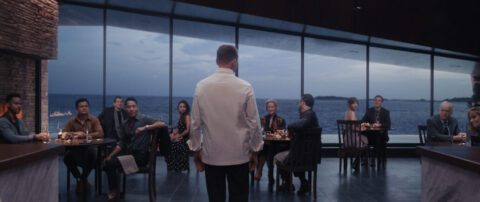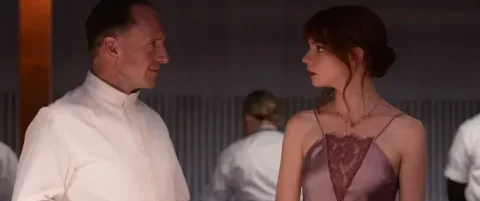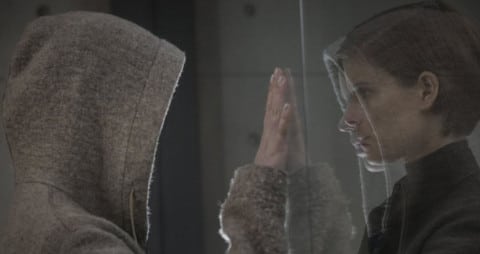The Menu (2022)
Directed by: Mark Mylod
Written by: Seth Reiss, Will Tracy
Starring: Anya Taylor-Joy, Hong Chau, Nicholas Hoult, Ralph Fiennes
USA
IN CINEMAS NOW
RUNNING TIME: 106 mins
REVIEWED BY: Dr Lenera

Hawthorne is a very exclusive restaurant situated on a private island. It’s operated by celebrity chef Julian Slowik, who insists on absolute perfection and runs the place in a very rigid fashion. Arriving there are a disparate group of people who are all wealthy except for Margot Mills, who’s replaced somebody else as the girlfriend of Slowik fanboy Tyler. The meal begins, but the first few courses are based on molecular gastronomy and the bread dish doesn’t even contain any bread, while most of the guests are increasingly discomforted by the very strict and almost ritualistic manner in which the meal is being carried out….

I guess that this might make me seem uncultured, but I could never get into the fine dining experience. While I can certainly appreciate and often love a good meal, having lots of courses with not much on the plate of any of them may have been an interesting experience the first time around, helped by the company so that conversation flowed during the waits between courses, but struck me as being a little silly and pointless because I was still hungry afterwards. Not every meal needs to totally fill you up, but it should certainly leave you satisfied and not have you craving for something extra. The Menu, which initially seems to be poking fun at fine dining but soon reveals itself to be attempting to do a lot of other things too, contains a lot of memorable moments, but, if you share my views of fine dining, the one that will probably stick out most will be when our heroine Margot tells Chef Slowik that she’s hungry. I felt like cheering, though what’s truly priceless is the look on Slowik’s face – after which she goes one better and asks him for a cheeseburger. Even though we’re near the end of the film and Slowik has proved to be a very dangerous and rather mad person indeed for some time, Slowik’s reaction to this request is rather different from what we’ve come to expect. But then there are quite a few things which are unexpected in Mark Mylod’s film [his first theatrical feature in ten years in a career mostly in television, even if one will be able to get a vague idea of where things are going quite early on. The screenplay by Seth Reiss and Will Tracy is full of sharp, sarcastic dialogue, all of which is well delivered by a well chosen cast, but the black comedy thriller with horror tinges struggles a little from seeming to satirise and commentate on too much for one movie.
We’re first introduced to Tyler and Margot, the latter being a last-minute replacement, but soon meet other guests. These include food critic Lilian Bloom and her editor Ted, wealthy couple and regulars Richard and Anne Liebbrandt, movie star who’s a bit past his prime George Diaz and his personal assistant Felicity, and business partners Soren, Dave, and Bryce. The group are given a tour of the island by restaurant captain Elsa, who notes that Margot was not Tyler’s original guest for the evening. She seems rather strict and even hiding things, though to be honest none of the guests seem particularly present either except for Margot. Even Tyler doesn’t seem very nice, being rather arrogant and talking to Margot like she’s beneath him, not to mention his rather pathetic fawning over Slowik and his food. As dinner’s about to begin, we cut around the guests, getting a sense of what they’re like and what their relationships with each other while keeping the pace going even though nothing exciting happens for a while. Slowik comes on to introduce the first dish, onscreen text also doing the same as it does with each successive dish, something which will come in handy if you watch the film at home and then want to hold a dinner party and piss off your guests. The first few molecular gastronomy dishes receive understandably mixed reactions from the group, with Tyler being positively ecstatic about the experience; despite no photography being allowed, he takes secret snapshots of his plates while trying to work out how each thing was prepared. However, Margot isn’t fond of either the food or the restaurant. And who’s that woman getting through all that wine in the corner?
To be honest, can you blame anybody for not liking a place which serves only the dips that go with bread, not the bread itself? Not to mention the way that Slowik seeems to run such a tight ship with the poor cooks slaving over a long table in full view of the customers, slapping his hands to get attention and announcing each course. Slowik and Elsa question Margot’s presence, but she refuses to share any information about herself. The courses and Slowik’s accompanying monologues become more disquieting. The third course, entitled “Memories”, begins with Slowik detailing an event from his childhood in which he defended his mother from his alcoholic father by stabbing him in the leg. The guests are then served chicken thigh with scissors stuck in the meat, along with tortillas laser-engraved with evidence of things that they’ve done wrong. This especially annoys Soren, Dave, and Bryce, and what’s behind one particular door? For the fourth course, called “The Mess”, Slowik introduces Jeremy, the sous-chef who designed the dish, then explains that Jeremy has trained for a long time to achieve his ambition of becoming Slowik, but despite his own talent and success, is nowhere near as good as Slowik and could never be, and no longer wants a life like Slowik’s. A shocking end to this really gets the guests on edge, though a few think it was just staged for their entertainment. Then Richard tries to leave the restaurant, but seriously pays for it. Slowik declares that this is all part of “the menu” -that all of the night’s guests were chosen for reasons tied to Slowik’s frustration with his craft and search for perfection, and his resentment towards the wealthy and those who take advantage of others’ hard work – and believe me, if you think that I’ve given too much away, let me tell you that there are a lot of turns to come before a slightly underwhelming, if fairly logical in context, finale.

So we have quite a lot to consider here, right from all the guests who seem modelled on personality types that are common if you work in the service industry. Of course the thoroughly pretentious nature of fine dining seems to come foremost under fire, but then there’s also the quest for perfection, and the marriages between art and artist, and artist and consumer. Slowik has become totally obsessive in creating the perfect dishes, but has lost touch of what his public might want, though he has his fans including Tyler who totally believes the bull**** that comes out of Slowik’s mouth, something which suggests that rabid fans of an artist can be a bad thing more than a good thing. We’re asked to consider how much we buy into hype, and are Rees and Tracy also suggesting a parallel with the production of all sorts of art, including movie making, which for some time now has been in serious trouble, with only huge special effects spectacles tending to make lots of money in terms of Hollywood’s output, yet the majority of the public [well, outside movie discussion forums] lap it up? When will a significant number of people begin to resist the hype, question this and demand something different? There’s some jabbing at the privileged rich too in a film which tries to do a bit too much; one can sense the writers thinking about all those subjects which they wanted to say something about. That can be a good thing, seeing as we’re currently in an era where being asked to think really isn’t very prominent at all, but perhaps a little less of this may have resulted in a more cohesive piece. Of course there’s also the possibility that in one or two aspects I’m barking up the wrong tree, but then unconscious meaning is also a thing.
Sill, it’s most definately possible to enjoy The Menu without having to use your brain too much. The feeling of claustrophobia as we realise that the characters are trapped in this place is very strong, and there are times when things are on the verge of getting a bit frightening, though the film then pulls back from this, which is initially frustrating but becomes fine when you’re in the particular groove that this film provides. A particularly notable scene involves Matthew Cornwell as Dale, a coast guard officer who suddenly comes into the fray; we’re hopeful that things will become sunnier but are not too annoyed when this thought is thrown in our face because it’s also pretty funny. Frequent use of character closeups perhaps betrays MyLod being far more experienced in television, but they’re used well here, though perhaps we should praise editor Christopher Tellefson more for some expert scene transitions. And the performances are all totally spot on. I wanted to spend more time with some of the supporting characters, especially Lilliam the snobby food critic who helped to make Slowik famous, played expertly by Jant McTeer, partly because of the clever writing which suggests a great deal, but also because of the performing. Fiennes is truly at his best; sometimes his character does things that aren’t logical in any way but Fiennes makes you believe it, as well as causing us to sympathise with this guy who only wants to be appreciated for his work [don’t we all?], even though his obsession with this has turned him into a psychopath. And Anya-Taylor Joy continues to impress, one of the finest actresses of her generation.
Food is one of life’s great pleasures, so it’s great that most foodie films make you want to and gorge yourself at a restaurant of your choice as soon as it’s finished. This one probably won’t, despite all its closeups of dishes which seemed pretty un-appetising to my unsophisticated palette. This perhaps places it closer to the likes of Le Grand Bouffee and The Cook, The Thief, The Wife And Her Lover, even if it’s not particularly like either film. Its mostly cold, cutting [in more ways than one] nature isn’t allowed to totally overwhelm the very sad tale of a man who’s never satisfied with his art, and has this dissatisfaction drive him mad. The Menu is quite mysterious, fairly original and has a lot to say.
Rating: 














Be the first to comment